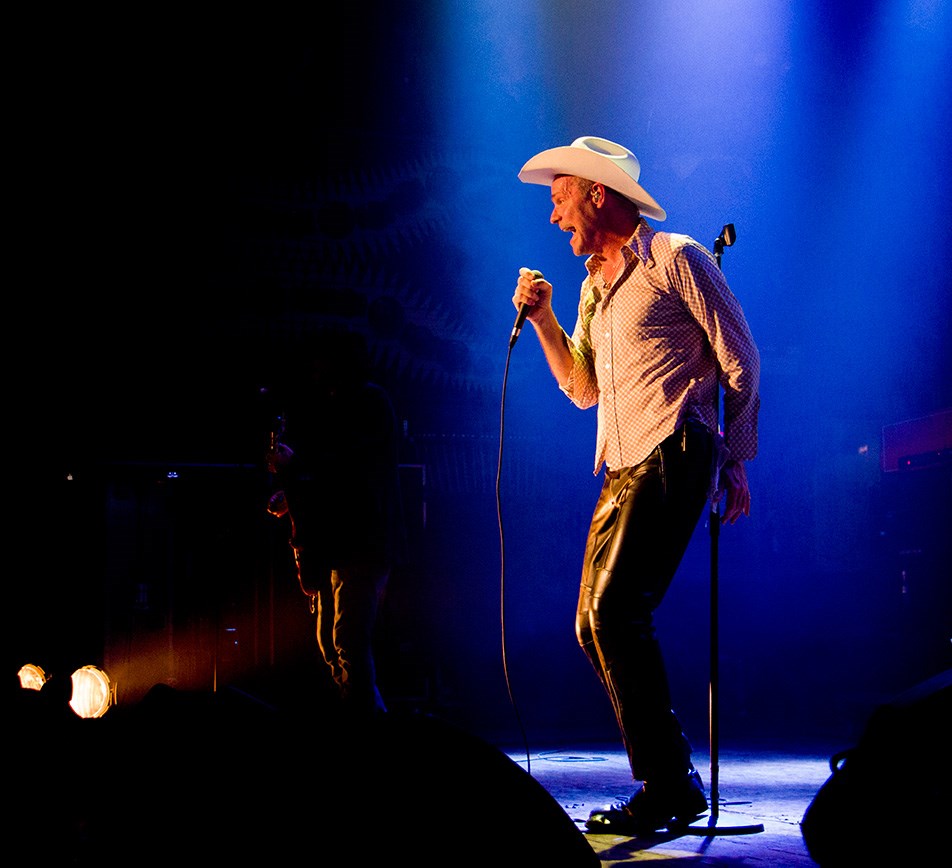A common theme, through this public and poignant extended wake for a national treasure, is that Gord Downie and The Tragically Hip were the quintessential Canadian band.
Some went even further, saying that The Hip embodied this country – a nation of lakes and toques and apologies distilled into one five-piece set from Kingston.
“The Tragically Hip are both part of the Canadian fabric and born of it,” read a Globe and Mail article published on the eve of their final concert last summer. “For many, they are the articulation of Canadianness.”
It’s a compelling narrative, particularly when you consider the band had not just one but two guys named Gord. Add in the songs about hockey and the penchant for denim, and voila – Canada the Band.
Watching Gord Downie – who died last week at 53 – go through a very public final encore, I’ve come to realize, however, that the band, and Downie in particular, were not exactly Canada incarnate. They were better. He was better.
Gord Downie – through all the albums and all the unfailingly polite interviews, through a powerful project about residential schools, through a final tour performed after incredibly invasive brain surgery – was not just holding up a mirror to our land and showing it for what it was. He was drawing a new map, guiding us to a vision of what he thought this country could and should be.
Here are four lessons I learned from Gord Downie:
1. Everyone is welcome
If there’s a goal that everyone remembers/it was back in old ’72/We all squeezed the stick and we all pulled the trigger/and all I remember was sitting beside you
Like many of the band’s most fervent fans, I got hooked on The Hip by the arena rock thunder paired with the absolute howls of their lead singer. “$2.50 for a highball, and a buck and half for a beer!” What can I say – I was a teenager, my whole life was a sweaty guitar solo.
Dudes loved it. The ladies? Apparently not so much. During the final tour, Downie admitted that he and the band made a very conscious decision to tone down their yowling after their first few albums, despite their huge commercial success. They wanted women at their shows – because women are great! – and that wasn’t happening when their concerts were just a bunch of angry dudes mosh-pitting each other.
They grew. They changed. They invited everyone to come along. Not everyone did – album sales were never quite the same – but just look at who was there with them at the finish line decades later: You. Me. Millions.
2. Reconciliation
Now the struggle has a name/We are the same, it hasn’t changed
In Long Time Running, the documentary film about The Hip’s final tour, Downie says he realized midway through the band’s final concert, broadcast live on CBC, that he hadn’t said much to the crowd. “I remembered these two words: First Nations.” He was singing a song called “Courage.”
There on stage he made a plea for reconciliation with First Nations people, and one month later he launched the Secret Path project. Secret Path is an album, a book, a film, a movement created out of the story of Chanie Wenjack, a boy who, like so many others, died after being placed in a residential school. He was trying to walk home so he could see his dad.
It’s a project that seemed, given the public appearances and private trips he made in his final months, much more important to Downie than anything else in his entire career. Find Secret Path. Watch it. Canada needs to know.
3. Never stop learning
Shakespeare, you’re a drunken savage/Well, you’re a sober and green-eyed Voltaire
The Hip’s songs about the Toronto Maple Leafs, cottage country and Kingston film productions involving Elvis were the biggest crowd pleasers and easiest to paint with a patriotic brush, but Downie’s lyrics are full of weird wisdom and thought-provoking tangents about a huge range of topics. Why is the song “Courage” dedicated to author Hugh MacLennan? What Wallace Stevens poem prompted the song “The Dire Wolf?” What’s so funny about “two tough-talking goalies, really going at it upstairs.”
Listening to and reading Downie’s lyrics makes you want to be smarter, just so you can to keep up. Good news on that front – the website A Museum After Dark is a rabbit hole you can dive into for hours, unpacking Hip lyrics alongside other travellers who have been seeking out roadside attractions for years.
Water conservation, stupid municipal bylaws, explorers, what flavour of human sharks prefer … want to know more? It’s all in Downie’s details.
4. Live your best life
Use it up, use it all up/don’t save a thing for later
The above lyric, taken from the works of post-modern writer Raymond Carver, was reportedly a powerful mantra for Downie. Looking at his closing act, there’s no denying that Downie followed that advice.
“I did not think there was any way in hell we would get to the tour,” guitarist Rob Baker said bluntly in Long Time Running.
“If I don’t do this I think I’ll be crushed,” Downie said. “Just crushed. I don’t want to go out like that.”
And he didn’t go out like that. Armed with skill and determination – as well as a wall of teleprompters – Downie and the band crossed Canada one last time. He stood and sang his heart out for all of us. He didn’t go out with a sigh. He went out with a shout. He used it all up.
All along, Downie stood for Canada. But he stood for so much more too.
The map is drawn. It’s up to us to follow it.
What are your thoughts? Send us a letter via email by clicking here or post a comment below.



